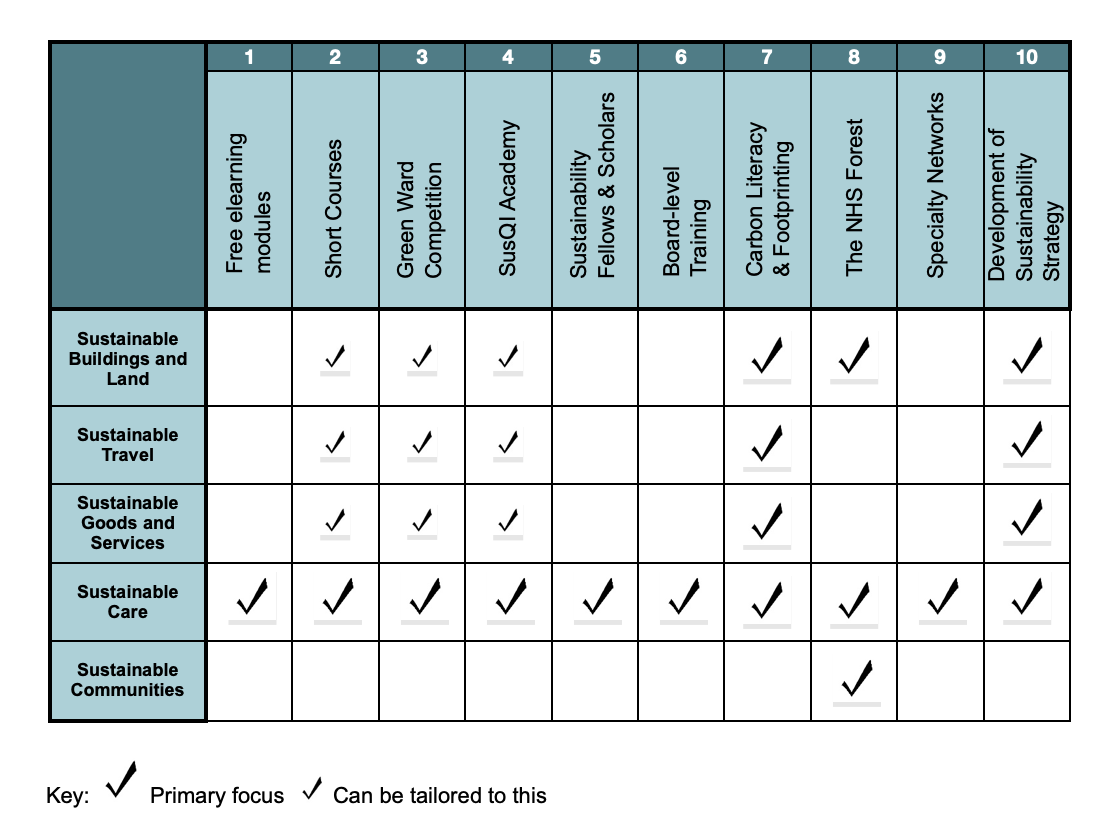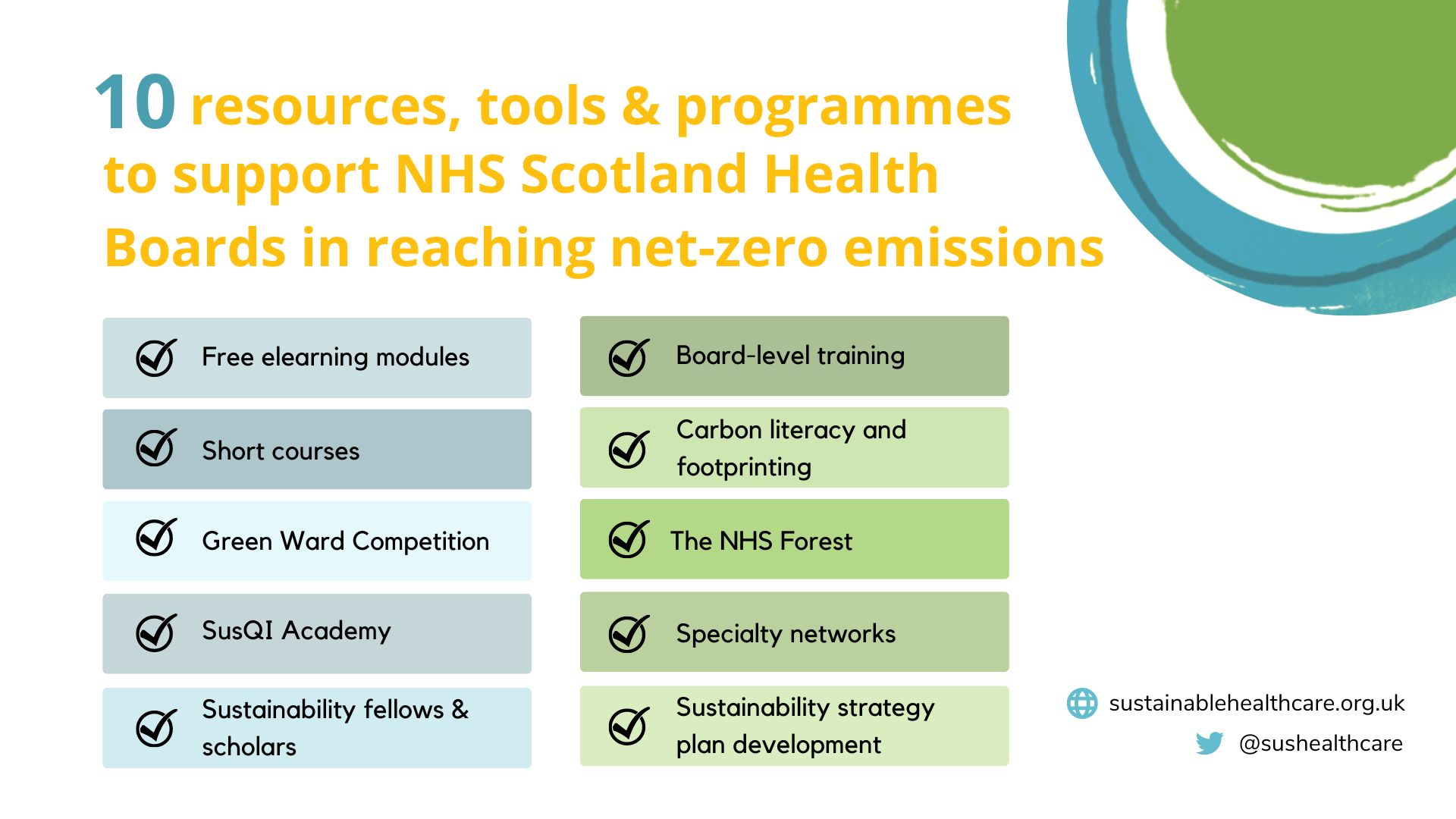NHS Scotland Sustainability Strategy Resources and Support
In 2019, NHS Scotland became the first national health service in the UK to commit to becoming a net-zero organisation, recognising the need to act to address the climate emergency and loss of biodiversity.
NHS Scotland launched the 2022-2026 Climate Emergency and Sustainability Strategy in August 2022, which outlines five priority areas to assist them in achieving net-zero emissions by 2040 and becoming an environmentally and socially sustainable service.
Beginning in November 2022, each Health Board will be required to publish an annual report detailing its progress towards:
- the goals and targets outlined in "A Policy for NHS Scotland on the Climate Emergency and Sustainable Development"
- the actions outlined in the “2022-2026 Climate Emergency and Sustainability Strategy”
The report will also include the Health Board’s National Sustainability Assessment Tool (NSAT) score, which measures their progress across sixteen different areas of sustainability.
NHS Scotland Priority Areas
Within the NHS Scotland Climate Emergency and Sustainability Strategy there are five priority areas, each with associated actions:
- Sustainable Buildings & Land
- Sustainable Travel
- Sustainable Goods & Services
- Sustainable Care
- Sustainable Communities
Resources, tools and programmes to support Scotland Health Boards in reaching net-zero emissions
Since 2008, the Centre for Sustainable Healthcare has worked with healthcare providers, health boards and trusts to create more sustainable healthcare systems. We provide a variety of resources, tools, networks and training programmes to support Health Boards in reaching net-zero emissions and advancing towards the goals outlined in the 2022-2026 Climate Emergency and Sustainability Strategy.
Table 1. NHS Scotland Priority Areas matched to CSH resources, tools and programmes

For healthcare organisations in England, please view our Green Plan resources here and for healthcare organisations based in Wales, please view our Decarbonisation Action Plan resources here. Healthcare organisations outside of United Kingdom, looking to develop their sustainability plans may also find the below resources useful. Please get in touch with us if you would like to discuss this further.
1. Free elearning modules

CSH partnered with NHS HEE elearning for healthcare, to develop and provide free elearning modules to all staff groups. The ‘Environmentally Sustainable Healthcare’ programme modules take approximately 30 minutes to complete and participants are provided a downloadable certificate after completion of the module.
- ‘Building a Net Zero NHS' raises awareness about the demands and opportunities of a sustainable healthcare system. It presents a short animated film about a healthcare worker discovering the existing work on preventing climate change in the health system. It includes interactive activities that reinforce key information and case studies of successful projects
- 'Sustainable Dentistry and Measuring Carbon in Healthcare’ describes the relationship between climate change and health and the application of sustainability principles in the dental setting.
- 'Environmentally Sustainable Anaesthetic Practice' raises awareness of the impact of healthcare and methods of using healthcare resources efficiently within an operating theatre setting. This helps establish the Green Theatres NHS Scotland aims for via the National Green Theatre Programme.
The modules can be accessed here.
2. Sustainable Healthcare Short Courses

The Centre for Sustainable Healthcare offers a series of short training courses that equip participants with the skills and motivation to initiate and deliver innovative low-carbon healthcare. These are designed as workforce training of healthcare professionals at all levels. They consist of:
- Engaging and interactive self-study materials
- Live online workshop led by experts to help you apply theory to practice and design a sustainable healthcare project
- Follow-up mentoring in sustainable healthcare cafés
View our short courses here. Additionally, we offer block-booking rates and training packages for health boards, trusts and national organisations; please email us for more information.
3. Green Team Competition

This award-winning leadership and engagement programme mentors six teams from a health board or trust to identify carbon hotspots in their service and then develop, implement and evaluate a sustainable quality improvement project. A cash prize is awarded to the team whose project has the biggest positive impact or potential to do so and the highest quality projects are recommended for spread throughout the organisation.
In 2020, the Green Team Competition at Frimley NHS Foundation Trust was won by the paediatric respiratory team. Their project reduced the environmental impact of metered-dose (‘puffer’) inhalers used in the paediatric service. The forecast annual savings for all teams was £12,417 & 424.3 tonnes CO2e. The Recovery Team were the winners of the University Hospital Dorset Green Ward Competition. They replaced single-use ethyl chloride spray for spinal/epidural block testing with a reusable metal ‘cold stick’. The forecast annual savings for all teams was £37,042 & 16,399kg CO2e respectively.
Benefits of the Green Team Competition include:
- Training clinical staff in the skills required to run sustainable quality improvement projects and to teach others
- Engaging senior leadership in sustainable healthcare through inviting them to judge projects
- Forging good working relationships between all those required to deliver sustainable healthcare, especially helping sustainability managers work with clinicians and quality improvement teams – a real morale booster
Learn more here, and to discuss running a Green Team Competition at your Health Board please email our Green Team Programme Manager, Rachel McLean.
4. Sustainability in Quality Improvement (SusQI)

The recent net zero targets for the NHS acknowledge that significant change needs to occur to make healthcare more sustainable. But how? The mechanism for change in the NHS is quality improvement (QI); integrating sustainability into your QI framework will help to ensure that sustainability is included in every QI and transformation project carried out in your organisation. This will help to embed sustainability into operations and governance, create sustainable improvements and change culture.
The SusQI framework is an innovative approach to holistically improve healthcare by assessing quality through environmental, social and financial impacts – these three factors combine to form the ‘triple bottom line’. By applying CSH’s four principles of sustainable clinical practice, health professionals can respond to both environmental challenges and social inequalities, while also saving money.
We have a range of SusQI support options for healthcare organisations, including:
- SusQI Academy
- SusQI Beacon Site Recognition
- Green Ward Competition
- 3-part SusQI course (block booking discounts are available)
- Open Source ‘Step by Step’ Guide to SusQI
- Open Source ‘SusQI Educator pack’
We are currently working with NHS Education for Scotland through our SusQI Academy to integrate sustainability into quality improvement training materials and resources.
To see examples of how the framework has been used in different organisations to achieve sustainable transformation; visit our Green Ward Competition and Green Surgery Challenge pages. Contact our programme lead, Catherine Richards if you would like to discuss integrating sustainability into quality improvement in your organisation.
5. Fellows and Scholars

CSH partners with NHS and medical specialties to train clinicians to move Climate Emergency and Sustainability Strategies forward through Fellow and Scholar roles. Fellows and Scholars are mentored by CSH experts and supported by in-house resources including training courses, web-based networking tools, online case libraries, and the sustainability in quality improvement (SusQI) toolkit.
A CSH Sustainability Fellow is seconded or employed to work half- to full-time on sustainable healthcare for 1-3 years. Fellowships often include a research element supported by a university partner; they may focus on a clinical specialty or on a cross-cutting theme such as education, quality improvement or a specific topic (e.g. single-use plastics). A CSH Sustainability Scholar is allocated 1 day per week to work on a Climate Emergency and Sustainability Strategy related project over the course of a year and is based in a host organisation – often a Health Board.
Current examples include:
- National Fellow in Sustainable Anaesthesia, in partnership with Newcastle University Hospitals NHS Foundation Trust and the Association of Anaesthetists
- Welsh Clinical Leadership Fellow in partnership with Cardiff and Vale University Health Board
Guidance on how to set up a fellowship or scholar position and how to gain funding can be accessed here.
6. Board Level Training for Sustainable Healthcare
For executive-level staff we offer a two-hour workshop in leadership for sustainable healthcare. We outline the expectations of the 2022-2026 NHS Climate Emergency and Sustainability Strategy, highlight what is unique about leadership for sustainability and explore how to inspire people to lead and measure change. For more information, please email Stefi Barna.
7. Carbon Literacy and Footprinting

Identifying your carbon hotspots puts you in the best position to set your Climate Emergency and Sustainability Strategy priorities and to develop decarbonisation initiatives with the highest impact. CSH offers a variety of free carbon footprinting tools and resources, as well as a short course, Carbon Footprinting for Healthcare. In-house experts can help estimate and analyse your carbon footprint at an organisational, departmental or clinical pathway level. Current examples include modelling the carbon footprint of dental procedures and analysing the triple bottom line of eye motility services at Moorfields Eye Hospital and its satellites.
For more information, please email Ingeborg Steinbach
8. The NHS Forest

Your site can be literally greener - drawing holistically on the therapeutic potential of nature. NHS guidance tasks NHS trusts to prioritise interventions which simultaneously improve patient care and community wellbeing while tackling climate change and broader sustainability issues. Green space initiatives can do this.
NHS Scotland's Natural Greenspace Demonstration Project has shown a remarkable potential to deliver better health outcomes and better climate outcomes through this initiative. This initiative is partnered with many regional and national organisations, such as Scottish Forestry, Transport Scotland and NHS Forest (via planting trees as well as encouraging contact with nature alongside outdoor exercise - the so-called Green Health Prescription).
The NHS Forest is a national alliance of over 200 UK health sites working to transform their green space and to realise its potential for health, wellbeing and biodiversity. This can mean beautiful gardens for rest and recovery; woodland, orchards and meadows that help to lock up carbon and growing space for fruit and vegetables to supply hospital kitchens. This good practice network captures learning from the best NHS green space initiatives – both at health sites and in the community – and works with individual health facilities on innovative projects.
We run an annual conference and awards scheme and provide help and guidance on all aspects of the use of green space in healthcare, from advice on tree planting to research evidence. Each year in the tree planting season we give away trees to NHS sites that can help plant the NHS Forest. To request trees contact info@nhsforest.org. You can register your site with the NHS Forest network. We also work in partnership with NHS organisations to employ Nature Recovery Rangers at health sites with a remit to engage patients, staff and local residents in activities that connect people to nature, support biodiversity and enhance green space for wellbeing. View our ranger video. If you are interested in partnering with us to host a ranger at your site, please contact info@nhsforest.org.uk for more information.
Our Green Space and Health course offers evidence, inspiration and support for health staff developing green space projects.
9. Peer Networks

Our international specialty networks are set up around communities of practice. With over 4,600 members on 29 networks, clinical and non-clinical staff are able to share resources, ask questions and participate in discussions. Join here.
Locally, the Scottish Environmental Anaesthesia Group promotes good practice to reduce the environmental impact of anaesthetists. Join here.
Scottish (Managed) Sustainable Health Network (SMASH) is a public health network which addresses health inequity. Join here to collaborate with people from a variety of fields, keep updated on projects, and access shared resources and courses.
10. Developing your sustainability strategy
Together with relevant stakeholders, we will help you create a vision, approach and initiatives to reduce your carbon emissions while improving patient care. Your plan will address your local priorities while following the national Scottish trajectory for a net zero Public Sector by 2040. For more information please email Ingeborg Steinbach.


